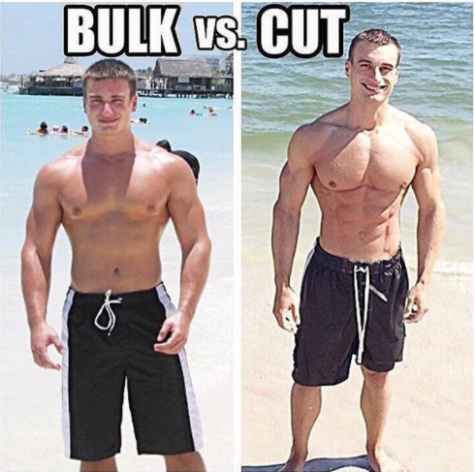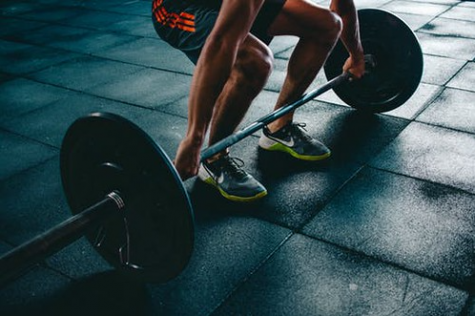Bulking Vs. Clean Bulking
November 11, 2021
 What will work for you if you want to bulk up in muscle mass? Bulking alone is gaining weight but instead of it being fat, it’s muscle. When done right, in the end, you will look big with your muscle but won’t be really defined. You can then go with a cutting plan and define your muscles. Now, what is clean and dirty bulking? Clean bulking is eating a healthier, controlled meal, usually 3-5 times a day, and tracking the number of calories you intake per day. With dirty bulking, as you can imagine, anything goes, like fast food, anything as long as you get the calories in. This most of the time isn’t being kept track of.
What will work for you if you want to bulk up in muscle mass? Bulking alone is gaining weight but instead of it being fat, it’s muscle. When done right, in the end, you will look big with your muscle but won’t be really defined. You can then go with a cutting plan and define your muscles. Now, what is clean and dirty bulking? Clean bulking is eating a healthier, controlled meal, usually 3-5 times a day, and tracking the number of calories you intake per day. With dirty bulking, as you can imagine, anything goes, like fast food, anything as long as you get the calories in. This most of the time isn’t being kept track of.
Of course, there are some pros and cons between these two. The upside for going on a clean diet is: you’re healthier, eating things that might not have a lot of oil or fat, naturally because you want to gain lean muscle. Cons would have to be the cost; this all depends on where and how you want your food, but you can also stick with low-cost food. It might not be 5-star food, but it gets the job done. Dirty bullying pros, essentially easier to get the calories in, you have no limits in what you can eat. This is why it’s popular with beginners. The cons: you can develop health problems later on if you keep it up for a long time; that is why you can limit how long you are on it and slowly converge in a clean bulk to lower the health risks. Your muscles won’t be lean; they’ll contain some fat in them.
 All you need to do now is to eat a surplus amount of calories to build muscle. The average calorie intake for men in the US is 2,500 and for women is 2,000 so that means that you have to eat more calories depending on how many calories you burn. I myself try to eat a little under 4,000 calories every day and lose around 800-1,000 calories/day. According to the Calorie Burn Rate Calculator, if you’re doing weightlifting at a vigorous level, then you burn 504 calories/hour, of course, this all depends on your weight and how long you’re actually doing it. So eat enough to build muscle mass. Bottom line is, when done correctly, they both work to get the same results. One may have more health risks than the other and you gain fat along with your muscle. However, as long as you stop before you gain massive amounts of fat, there’s nothing wrong with the occasional dirty bulk.
All you need to do now is to eat a surplus amount of calories to build muscle. The average calorie intake for men in the US is 2,500 and for women is 2,000 so that means that you have to eat more calories depending on how many calories you burn. I myself try to eat a little under 4,000 calories every day and lose around 800-1,000 calories/day. According to the Calorie Burn Rate Calculator, if you’re doing weightlifting at a vigorous level, then you burn 504 calories/hour, of course, this all depends on your weight and how long you’re actually doing it. So eat enough to build muscle mass. Bottom line is, when done correctly, they both work to get the same results. One may have more health risks than the other and you gain fat along with your muscle. However, as long as you stop before you gain massive amounts of fat, there’s nothing wrong with the occasional dirty bulk.
The most important thing while doing this bulking journey is rest; your muscles need rest in order to replenish your muscle fibers. Also, if you don’t get at least 8 hours of sleep and you work out every day if you find yourself feeling fatigued, developed a pain/injury or like you just need to take some time off, I recommend that you take a day off to let yourself recover.
After doing my research, I will help you guys choose some of the foods that are the most effective and budget-friendly to add to your diet. These can be found wherever you get your cheap groceries:
- Ground Beef, try to get the leanest you can find to build lean muscles.
- Eggs, giving you 5-7g of protein and 5g of fat, you can’t go wrong with these.
- Whole Milk, having a bad reputation in the past. Recent studies do not stand with that claim, since you are trying to gain weight, whole milk is your choice.
- Peanut Butter, providing a decent amount of protein and other vitamins for you per serving, is another good choice for you to add to your diet.
- Oats provide a good amount of calories and protein and have many other benefits.
- Beans (canned or dried), loaded with fiber, something which bodybuilders often do not get enough of on a regular basis
- Rice, a classic bodybuilder food, rich in carbs, replenishes the muscles fast recovery
- Olive Oil, while a bit more expensive than regular oil, has many benefits to using it to cook your beef.
- Canned/Tuna, is by far the cheapest way to get your protein, whether it be fresh boneless tuna or canned and packed in oil, but i wouldn’t recommend eating huge amounts of it every day, many canned tuna may contain microplastics and a lot of mercury due to pollution. So eat a healthy amount of it and you’ll be good.
- Fresh/Frozen Vegetables, any healthy diet needs a good amount of vegetables whether it’d be fresh or frozen.
- Avocados have many nutritional benefits and are the number one fruit that gives the most protein, with 4 grams. It also contains good fats for you
- Bananas, having essential nutrient s this can be a good snack choice to eat before and after a workout
- Whey Protein Powder, although not necessary, for some it’s hard to eat a surplus amount of calories in a day, protein can help you with intake all your calories in different ways, smoothie, morning pancakes, etc. So, you might want to save up for some protein if you want. My go-to smoothie, 1 ½ cup of whole milk, 2 bananas, 1 cup of oats, 2 tbsp of peanut butter, 1 cup of frozen berries, and 1 scoop of protein, has over 1000 calories. It makes a little over 30 oz.
